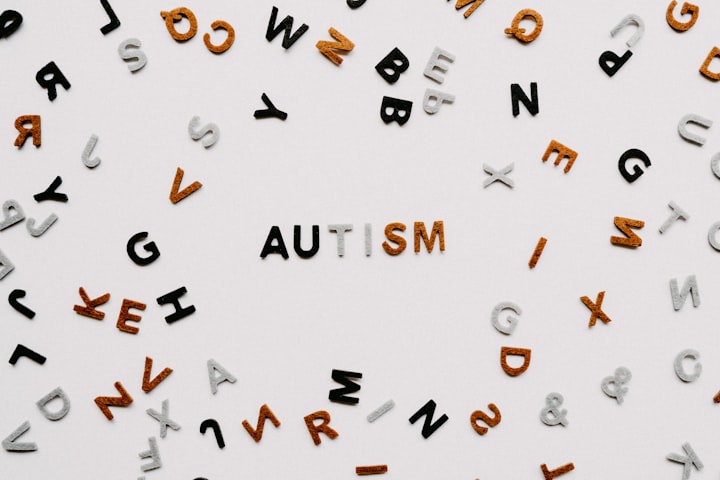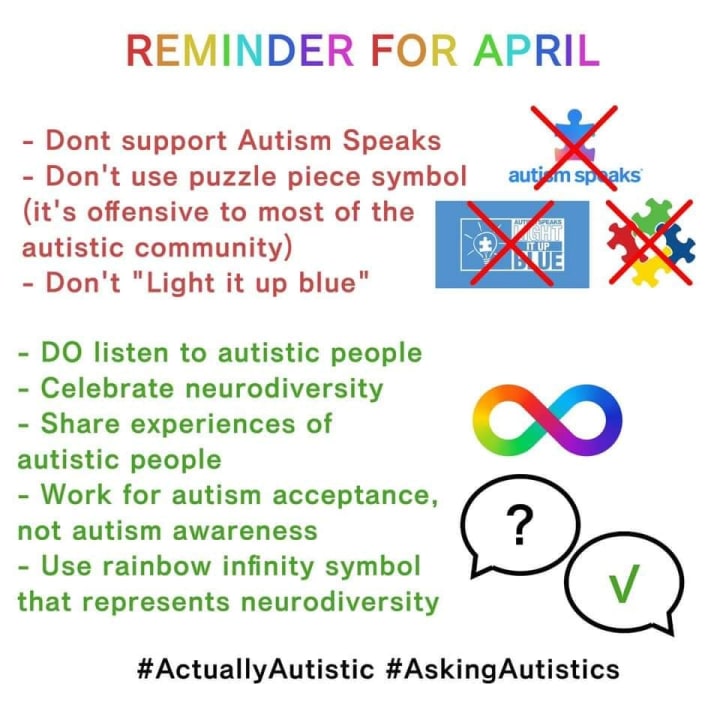April is World Autism Month
Let's talk about how you can show more support and allyship toward the autistic community.

This article discusses extreme ableism, eugenics, Nazism, and anti-Semitism. Please read at your own discretion.
Autism: Its History, Behaviour, and Comorbidities
Our modern understanding of autism has been influenced by social, societal, and scientific factors throughout history. Despite decades of research and education, and an increase in scientific understanding, autism still remains a largely misunderstood, feared, and stigmatized condition.
Autism Spectrum Disorder - or ASD - is a neurodevelopmental disorder characterized by a.) social difficulties, and b.) a presence of restricted or repetitive behaviours or interests. It was introduced first in 1911 by Swiss psychiatrist Eugen Bleuler, who believed it was a form of schizophrenia. Throughout the 1900's, autistic children were consistently diagnosed not with autism, but with various schizophrenia-related terms. In the 1980's, autism was formalized for the first time in the DSM-III as a mental disorder.
Today, most psychiatrists and medical professionals still consider autism a mental health condition. However, the autism rights movement, along with several researchers, consider it a neurotype. Autism is not linear. It's a spectrum, which means it can manifest very differently in each person it affects. Because of this, support needs and autistic traits vary greatly among the community.
Other traits related to autism include adherence to strict ritual or routine, resistance to change in routine, lack of eye contact or abnormal eye contact, repetition of words, phrases, or movements, and hyper- or hypo- sensitivity to sensory information such as taste, touch, or sound. Of course, as I've said, the vastness of autism and its effects means that no two autistic people will share exactly the same traits, or act in exactly the same way.

Correcting Myths and Misconceptions
Likely impacted by its portrayal in media, autism is a highly stigmatized condition. This stigma exists among non-autistic educators and researchers, communities of autistic people, and even health care providers. The thing about misinformation is that it's easy to spread, and many people can't be bothered to fact-check information they hear. For this reason, stereotypes and misconceptions continue to spread, which greatly harms the autistic community and leads to further mistreatment or isolation.
01. Autistic people lack empathy.
Firstly, I think it's important to acknowledge that empathy is not the same as sympathy, and it's possible to experience one without the other. Empathy is the quality of sharing another person's feelings by imagining onself in their situation. Sympathy is the quality of feeling distress or sorrow for the situation of another. Lacking empathy does not make someone unkind or uncaring - it simply means they cannot imagine themselves in the situation of somebody else.
With that said, it's a common belief that all autistic people lack empathy, and this simply isn't true. On the contrary, many struggle with hyper-empathy - feeling the emotions of others so strongly that they become overstimulated. Some feel more empathy at specific times, and less empathy at other times. It's important to remember that autistic people are not a monolith, and autistic-coded traits will not apply to everyone.
02. Autistic people are either high-functioning or low-functioning.
Functioning labels have been used for years, and they've always done more harm than good. In educational and healthcare settings, it's common for autistic people to be labelled high or low functioning based on how well they conform to societal standards of behaviour. Not only is this harmful, it's also ableist. One autistic people will not be exactly the same as the next, even though they may share strengths and challenges. Functioning labels add to the belief that one can either be "a little autistic" or "very autistic", with no sort of variation in between.
If we understand autism as a spectrum, we understand that each person has their own unique strengths and weaknesses, and that support needs may vary from day to day. Those labelled as high functioning struggle to get accommodation and support because our ability to act accordingly to society's standards of "acceptable" suggest that we don't need help. Those labelled as low functioning struggle to be accepted or acknowledged by others because many wrongly assume they will never be able to live independently. Furthermore, the level of support I may need, or the energy I have to exert into appearing normal is not always consistent. To suggest that this makes me high functioning is to dismiss the struggles I face to conform to the standard of behaviour that is expected of me, and to assume that accommodation or support is never needed.
03. Children can outgrow their autism.
Autistic children become autistic adults. Although it may appear that a person gets better with age, many autistic people spend years learning how to mask their autistic traits - because much of the time, it's impossible to avoid discrimination otherwise.
04. People with autism don't show affection or emotion.
Just like neurotypicals, autistic people have their own likes, dislikes, and preferences when it comes to affection. Although many people enjoy physical affection, many others are partial to quality time, or gift giving, or acts of service - and none of these ways of showing affection are any better than another. Every person is different, and every person shows affection in different ways.
Here's something that can be said for everyone, not just autists. When it comes to emotions, we cannot assume that a person doesn't love us just because they don't show love in the same way we do. It's crucial to remember that people show affection to us in any way they know how to, and these are often not the ways we want them to.
05. Autism has a look. You can tell someone is autistic by looking at them.
Because one of the traits of autism is a pattern of repetitive motion or movement (stimming), it is sometimes possible to pick up on behaviours or clues that someone might show. But even neurotypicals stim sometimes, and so using such behaviour to discern if someone is autistic is unreliable.
06. Vaccines cause autism.
Mostly, I'm just tired that this misconception still lingers. This misconception comes from a research paper that was published in 1998 by Andrew Wakefield, an anti-vaccine activist and former physician. Extensive study and research on the links between autism and vaccinations proved there was no correlation, and the fradulent paper written by Wakefield resulted in the confiscation of his medical license.
07. Everyone is a little autistic.
We know that autism is a neurological affect: a fundamental difference in the development of a person's brain. Therefore, it's not possible to be just a little autistic. You are either autistic, or you're not. Many times, people use this saying as an attempt to relate to someone else, to show that they identify with a behaviour or tic that an autist shows. This is problematic because it reduces a neurological disability to a mere quirk, thereby dismissing the obstacles that autistic people face daily.
08. Autism can be cured.
One of the main issues with Autism Speaks is that they view autism as a disease to be cured, rather than a neurotype. The organization spreads misinformation and compares autism to a terminal illness, claiming parents should mourn their children, and eliciting fear in uneducated parents and providers everywhere. Researchers have been studying autism for years. It's long been determined that we don't need to be cured, because there's nothing to cure.
Often, people speak about autism as if it's a bad virus - offering their condolences at the news of a diagnosis, promoting remedies and techniques in the hopes of making you healthy again. It's not a disease to be had, or an illness to suffer from. We do not have autism. We are autistic. It's a quality that's interwoven into every part of us, incapable of being taken away or outgrown.

The Dangers of the Term "Asperger's"
Between 1994 and 2012, Asperger's was a term used to describe autistic people labelled as high-functioning by the medical community. Asperger's Syndrome was a diagnosis given to many, primarily those whose autistic characteristics were mild in comparison to the majority of people diagnosed with autism. Although it's no longer a stand-alone diagnosis, many people who were diagnosed with Asperger's Syndrome in the past still consider it a 'subtype' of autism.
Hans Asperger was an Austrian physician in the 1900's. His work focused mainly on studying the neurology of children, specifically those who showed traits or behaviours typical of autism. In 1931, he received a job at the pediatric clinic of Vienna after the clinic director forcibly removed all Jewish doctors from the clinic, thereby aligning himself with Nazi ideology. Under the reign of Nazi Germany, he used his position as a doctor to make decisions regarding examinations of children. This entailed supporting children whom he believed could integrate into Nazi Germany, and sending away children whom he believed to be unfit.
During WW11, there was a children's clinic in Vienna known as Am Spiegelgrund. Here, physically or mentally disabled children were sent to undergo medical experiments they had never consented to. Here, they became victims of medical, nutritional, and psychological abuse, until all were eventually euthanized. Hans Asperger, a devout Christian man and self-proclaimed humanist, held the responsibility of choosing which children would be sent to this clinic, and which were fit to integrate with the rest of society. During the final two years of the second world war, Hans Asperger was a doctor for the Wehrmacht - the united armed forces of Nazi Germany.
Even today, Hans Asperger is hailed by many as a trailblazer of neurodiversity due to his role in defining autism. He remains a controversial figure, and is highly defended by autism scholars and researchers. In 2010, the diagnosis of Asperger's Sydrome as a stand-alone condition was removed from the DSM-5 and merged into the general diagnosis of autism.

Standing Up For Ableism: Understanding How To Be Supportive
The role of an ally is to support, stand up for, and advocate for a marginalized person or community. The unfortunate reality is that the disabled community is unlikely to be listened to or taken seriously without the help of non-disabled people. Allyship is more than just showing support. It's taking the time to combat stigma, educate others, and stand up for discrimination or mistreatment. There are many things that can be done to support the autistic community: not just in April, but every day of the year. After all, we still exist when April ends.
Being an ally to the autistic community begins with understanding that, even among neurotypical people, it's unrealistic to expect everyone to conform to societal expectations of behaviour. It begins with acknowledging and confronting our own internalized ableism in order to abandon the ideas we've been conditioned to believe. Even small gestures can make a world of difference. Support comes in the form of seeking out and amplifying autistic voices, and listening to us instead of speaking for us. It comes in the form of acceptance and accommodation, and learning to stand up for injustice instead of shrugging it off.
Ultimately, it's always okay to struggle. The idea of coming to terms with our internal biases is overwhelming, and being human makes confronting our own prejudices feel very uncomfortable. Standing up for the rights and acceptance of autistic people doesn't have to begin with a huge gesture. By taking time to educate ourselves, we can then educate others, creating a sort of ripple effect. Ignorance hurts all of us - and more than likely, you've met an autistic person or two, even without knowing it.

Sources
https://en.wikipedia.org/wiki/Autism_spectrum#History
https://en.wikipedia.org/wiki/Hans_Asperger
https://reframingautism.org.au/how-to-be-a-great-ally-to-the-autistic-community/
https://beaminghealth.com/article/15-autism-myths-that-should-be-debunked
https://en.wikipedia.org/wiki/Am_Spiegelgrund_clinic#Involvement_of_Hans_Asperger
https://www.themarysue.com/the-autism-speaks-controversy-explained/
About the Creator
ghostsandrebels
i'm a a queer writer, poet, cat lover, and author. i'm passionate about psychology, human rights, and creating places where lgbt+ youth and young adults feel safe, represented, and supported.
29 | m.
follow me on threads for more.






Comments
There are no comments for this story
Be the first to respond and start the conversation.